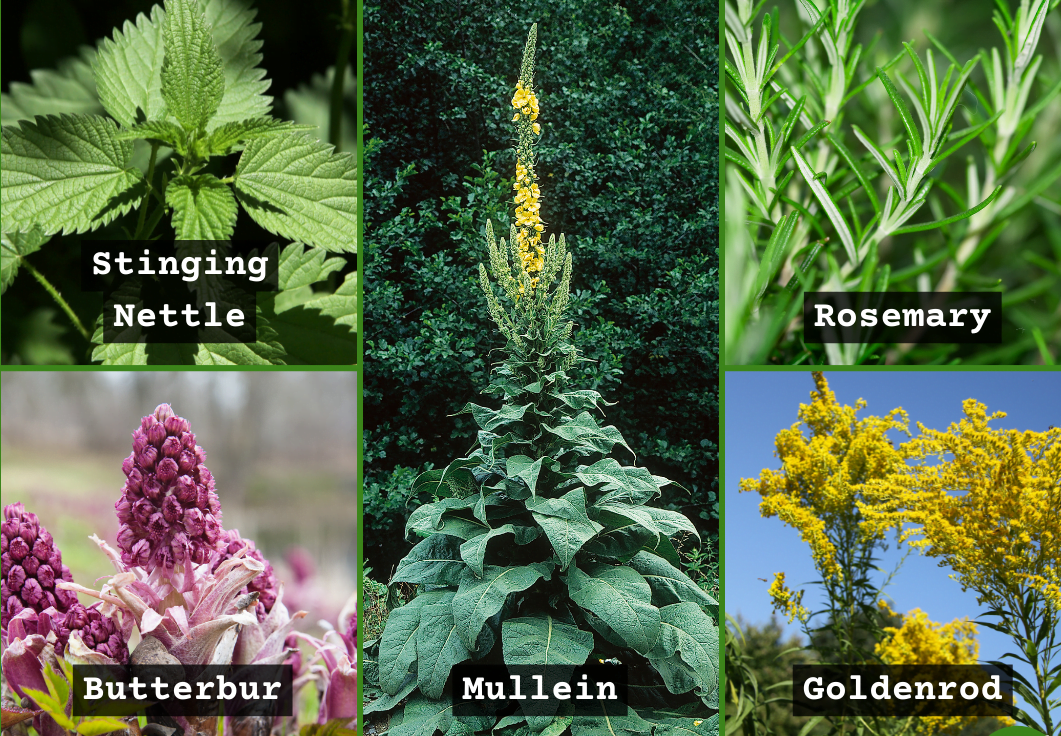Butterbur
(Petasites hybridus)
Butterbur’s effects are similar to those of cetirizine (the compound in Zyrtec) in patients with seasonal allergic rhinitis (Schapowal, 2002). The unprocessed plant contains chemicals — Pyrrolizidine alkaloids (PA) — that can cause liver problems so it is recommended people buy capsules instead of the herb and ensure they are PA free. The herb is also contraindicated, and not recommended, for people with ragweed allergies, pregnant women, and children.
Dosage (capsules): 50 mg butterbur root extract, taken twice daily for two weeks.
Goldenrod
(Solidago canadensis)
Goldenrod is often wrongfully blamed for allergies because it happens to bloom around the same time as ragweed. Goldenrod is an important and native pollinator plant that also happens to contain high levels of the anti-inflammatory constituent quercetin, which, along with its astringent action, can help alleviate the symptoms of allergies. It can help remove excess mucus and as such is recommended as a sinus wash by the Herbal Academy.1
Dosage (tea): 1‒2 teaspoons (3‒5 grams) of dried goldenrod per 1 cup (237 ml) of boiled water. Use the above-ground parts, especially the flowers and leaves. Cover and let sit for 10‒15 minutes, then strain. Drink up to four times daily.
Mullein
(Verbascum thapsus)
Mullein can heal respiratory tract infections that arise due to the invasion of allergens. As a tea, it can work to reduce chest tightness, shortness of breath, cough, asthma, and bronchitis. 2
Dosage (tea): 1–2 teaspoons (3–5 grams) of flowers daily per 1 cup (37 ml) of boiled water and/or 15 to 30 mL of fresh leaf or 2 to 3 g of dry leaf. Cover and let sit for 10‒15 minutes, then strain. Drink up to four times daily.
Rosemary
(Rosmarinus officinalis)
Rosemary’s rosmarinic acid can help suppress the inflammatory responses of white blood cells as well as allergic antibodies. This makes it a great option as an alternative and natural allergy relief remedy. Please see our Rosemary plant profile for more information about the possible uses of this herb. It is not recommended for women who are trying to conceive. 3
Dosing (tea): 1 teaspoon (3 grams) of fresh rosemary (use more if dried) per 1 cup. Cover and let sit for 10‒15 minutes, then strain. Drink 1-3 times a day.
Stinging Nettle
(Urtica dioica)
Stinging Nettle’s adenine, nicotinamide, synephrine and osthole have been found to have significant anti-inflammatory and anti-allergenic properties. 4 In one study, a one-month treatment with stinging nettle led to a significant decrease in clinical symptoms of rhinitis. 5
Dosing (tea): 1-2 teaspoons (4 grams) of herb per one cup of boiling water. Cover and let sit for 10‒15 minutes, then strain. Drink up to four times daily.
Dosing (capsule): 770 mg dried extract orally, twice daily.
Also, see Elderberry.
Sources

